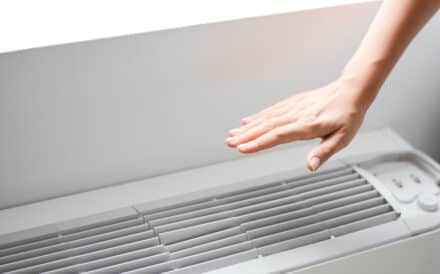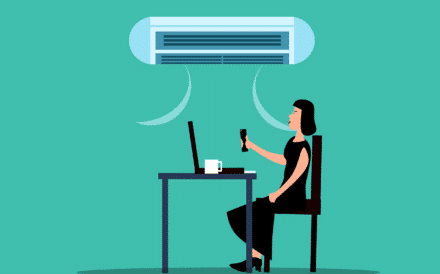Common AC Issue Diagnosis & When to Call the Pros
Explore a range of common air conditioner issues. Understanding these elements can help homeowners make informed decisions about their AC maintenance, ensuring their systems operate smoothly and efficiently, and keep your living spaces comfortably cool.
Common Air Conditioner Issues
Blowing Warm Air
One of the most frustrating issues for any homeowner during the hot summer months is when their air conditioner starts blowing warm air instead of cooling down the house. This issue could stem from several causes, such as dirty filters or coils, which impede the airflow and reduce the system’s efficiency. Low refrigerant levels are another common culprit, as the refrigerant is essential for absorbing heat from the air inside your home. Malfunctioning controls, including faulty thermostats or broken switches, can also mislead the system into operating improperly.
Clogged Air Filters
The air filter’s role in an air conditioning system cannot be overstated. It screens out dust, pollen, and other pollutants from the air, ensuring that your indoor air quality is clean and your AC system runs efficiently. However, over time, these filters can become clogged with debris, significantly diminishing airflow and forcing the system to work harder, which, in turn, reduces its efficiency and lifespan. The solution is simple yet effective: clean or replace your air filters regularly. For reusable filters, a wash with warm water and mild detergent will do, whereas replaceable filters should be exchanged every one to two months, depending on usage and air quality.
Failing Capacitor
The capacitor plays a pivotal role in the operation of your air conditioning system. It stores and releases electrical energy to start up the AC or keep it running by powering the motors. Symptoms of a failing capacitor include the AC’s inability to start, an intermittent cessation of cooling, or the system shutting off randomly during a cycle. These issues usually indicate that the capacitor is unable to hold a charge and needs replacement. Given the technical nature of electrical components, diagnosing and replacing a failing capacitor is best left to professionals.
Refrigerant Leaks
Refrigerant, or Freon, is the lifeblood of any air conditioning system, facilitating the transfer of heat out of your home. A leak in this system not only reduces the efficiency of your AC, but also poses significant environmental and health risks due to the toxic nature of the refrigerant. Signs of a leak include ice formation on the coils, a noticeable decrease in cooling efficiency, and the system struggling to reach the set temperature. Given the complexity and the hazardous materials involved, repairing a refrigerant leak should be handled by a certified professional.
Constant Cycling
An air conditioner that cycles on and off more frequently than normal is not only annoying but also indicative of an underlying issue. This could be due to several factors, including incorrect thermostat settings, dirty or damaged condenser coils, or external factors such as a heatwave causing the system to overwork. Regular maintenance, such as cleaning the condenser coils and ensuring the thermostat is correctly set, can mitigate this problem. However, if the issue persists, it may be a sign of a more serious problem requiring professional attention.
Maintaining your air conditioner is key to ensuring its efficiency and longevity. By understanding these common issues and addressing them promptly, you can enjoy a cooler, more comfortable home environment while avoiding the cost and inconvenience of major repairs.
Diagnosing and Troubleshooting Your Air Conditioner
Before you can effectively solve a problem with your air conditioner, you need to know what you’re dealing with. Here’s a step-by-step guide to diagnosing common AC issues without the need for a professional callout.
Steps for Diagnosis
- Check Refrigerant Levels: Low refrigerant levels can cause your AC to underperform or not cool at all. While checking the exact level requires professional tools, you can look for signs of low refrigerant.
- Inspect Air Filters: A clogged or dirty air filter can significantly impact your AC’s efficiency. It’s one of the simplest things to check and one of the most common causes of air conditioner problems. A filter that’s covered in dust and debris restricts airflow, straining your system and diminishing air quality.
- Review Thermostat Settings: Sometimes, the issue is as simple as incorrect thermostat settings. Ensure it’s set to “cool” and that the temperature setting is lower than the current room temperature. Also, check if the thermostat is working correctly; a malfunctioning thermostat can lead to erratic system behavior.
- Evaluate Insulation: Poor insulation can lead to cooling inefficiencies. Check around windows and doors for drafts and consider adding weather stripping or caulking to seal leaks. Inspect attic insulation to ensure it’s adequate, as heat from the attic can significantly affect your home’s overall temperature.
DIY Fixes for Quick Resolutions
- Replenishing Refrigerant: This task typically requires a professional due to the need for specialized equipment and the potential hazards of handling refrigerants. However, being aware of the symptoms can help you diagnose the issue before calling in an expert.
- Cleaning or Replacing Air Filters: This is a straightforward task most homeowners can undertake. Remove the filter according to the manufacturer’s instructions, clean it if it’s reusable, or replace it if it’s disposable. Doing this every 1-2 months can dramatically improve your AC’s performance and air quality in your home.
- Adjusting Thermostat Settings: Ensure your thermostat is set correctly for cooling and the desired temperature. If your AC isn’t responding as expected, try resetting the thermostat or replacing the batteries if it’s battery-operated. This can sometimes resolve issues related to incorrect AC cycling or the system not turning on.
By systematically diagnosing and addressing these common issues, you can potentially save yourself time and money on repairs. Regular maintenance, such as cleaning filters and checking thermostat settings, can prevent many problems from arising in the first place. However, if you encounter complex issues, especially related to refrigerant or electrical components, it’s best to consult a professional to ensure your system operates safely and efficiently.
Professional Repairs and When to Call Experts
While many air conditioner issues can be resolved with simple DIY fixes, there are scenarios where professional intervention is not just recommended but necessary. Understanding when to call in the experts can save you from further damage to your system, higher repair costs, or even safety risks.
Clogged Condensate Drain Line
The condensate drain line plays a crucial role in your AC system by channeling away the moisture extracted from the air. Over time, this line can become clogged with algae, dirt, or other debris, leading to water backup and potential water damage to your home or AC unit. While some adventurous homeowners might attempt to clear the line themselves, this task can often require specialized equipment like a wet/dry vacuum or a plumber’s snake. More importantly, improper handling can lead to further complications. Signs of a clogged condensate drain line include water leaks around your indoor unit or an overflowing drain pan. If you notice these symptoms, it’s wise to call a professional who can safely and effectively clear the line and check for any additional issues.
Broken Compressor Fan
The compressor fan, located in the outdoor unit of your AC system, is essential for transferring heat from your home to the outside air. If this fan breaks down, your air conditioner will not be able to cool your home effectively, and the system’s compressor might overheat, potentially leading to a costly breakdown. Signs of a failing compressor fan include strange noises from the outdoor unit, the fan not spinning despite the AC being on, or the unit overheating and shutting off prematurely. Because of the technical complexity and the risk of further damaging your system, repairing or replacing a broken compressor fan is a job for professionals.
Electrical Issues and Bad Connections
Electrical problems in an AC unit can range from minor issues like loose connections to more serious ones like short circuits or failing capacitors. Symptoms may include the AC not turning on, turning off unexpectedly, or frequent breaker trips. Electrical repairs can be dangerous and require a thorough understanding of your AC system’s electrical components. A professional technician can safely diagnose and repair these issues, ensuring your system runs smoothly without risking further damage or safety hazards. Additionally, they can inspect your system for any underlying issues that might be contributing to the electrical problems.
Knowing When to Call in the Pros at Silver State
If you encounter any of these issues, it’s best to consult with a professional. Attempting to fix complex problems on your own can not only lead to further damage, but also pose significant safety risks. Professionals have the tools, knowledge, and experience to diagnose and repair your AC system efficiently and safely. Moreover, they can provide invaluable advice on maintaining your system to prevent future problems. Remember, investing in professional repairs can ultimately save you money and extend the life of your air conditioner.
If you’re facing any air conditioner challenges, don’t hesitate to reach out to Silver State. Our team of seasoned professionals is here to offer you the advice, maintenance services, and repair solutions you need. Whether it’s time for a routine system evaluation or urgent repairs, Silver State is committed to restoring comfort and efficiency to your home. Contact us today to learn how we can help you maintain a cool and comfortable environment all year round.



